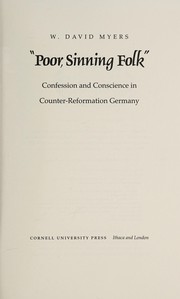Check nearby libraries
Buy this book

In "Poor, Sinning Folk," W. David Myers investigates the sixteenth-century fate of the medieval Christian sacrament of penance, the process of confessing to a priest in secret one's sins against God and other humans. In Pre-Reformation Germany, numerous layers of public ritual, expectation, and display surrounded the central secret act of confessing and conditioned its meaning.
Less frequent and less private than the ritual familiar to modern Catholics, medieval penance was for most German-speaking Christians a seasonal event with social as well as spiritual ramifications for participants.
Protestantism swept confession away from many German lands. Even where Catholicism survived and flourished, as in the lands comprising modern Bavaria, the sacrament of penance changed profoundly. The modern confessional booth was introduced, making the sacrament more prominent, more secure from scandal, and ultimately more private. This reform coincided with the efforts of secular rulers to fashion a more disciplined, obedient population.
New religious orders, most notably the Society of Jesus in Bavaria, saw the frequent confession of lay people as a means to piety and spiritual discipline amid the temptations of worldly affairs. By the middle of the seventeenth century, political and religious forces combined to forge the sacrament of penance into an effective instrument of spiritual discipline which would fashion the modern Catholic conscience and endure essentially unchanged into the late twentieth century.
Check nearby libraries
Buy this book

Previews available in: English
Subjects
Medieval, English History, Historical Fiction, Jewish History, Women's History, Medieval Romance, Middle Ages, Counter-Reformation, History, Penance, Confession, Church history, Fiction, Pénitence, Histoire, Contrareformatie, Histoire religieuse, Contre-Réforme, Schuldbelijdenissen, Biecht, Penance, history, Bavaria (germany), Austria, church history, Fiction, historical, general, Fiction, religious, Fiction, mystery & detective, generalPeople
Edward II, The Black PrinceTimes
1377| Edition | Availability |
|---|---|
| 1 |
zzzz
|
| 2 |
zzzz
|
| 3 |
cccc
|
|
4
"Poor, sinning folk": confession and conscience in Counter-Reformation Germany
1996, Cornell University Press
in English
080143081X 9780801430817
|
aaaa
|
Book Details
Edition Notes
Includes bibliographical references (p. 205-221) and index.
Classifications
The Physical Object
ID Numbers
Source records
Internet Archive item recordInternet Archive item record
marc_claremont_school_theology MARC record
Better World Books record
Library of Congress MARC record
marc_claremont_school_theology MARC record
Internet Archive item record
marc_columbia MARC record
Work Description
A tragic loss. A desperate journey. A mother seeks the truth.
In December of 1377, four children were burned to death in a suspicious house fire. Villagers traveled hundreds of miles across England to demand justice.
Sinful Folk is the story of this terrible mid-winter journey as seen by Mear, a former nun who has lived for a decade disguised as a mute man, raising her son quietly in this isolated village. For years, she has concealed herself and all her history. But on this journey, she will find the strength to claim the promise of her past and create a new legacy. Mear begins her journey in terror and heartache, and ends in triumph and redemption.
The remarkable new novel by Ned Hayes, illustrated by New York Times bestselling author/illustrator Nikki McClure, Sinful Folk illuminates the medieval era with profound insight and compassion.
Excerpts
Closing epilogue
Opening sentences
Links outside Open Library
Community Reviews (0)
Feedback?| August 1, 2024 | Edited by MARC Bot | import existing book |
| October 8, 2021 | Edited by ImportBot | import existing book |
| October 8, 2021 | Edited by ImportBot | import existing book |
| August 3, 2020 | Edited by ImportBot | import existing book |
| December 10, 2009 | Created by WorkBot | add works page |













